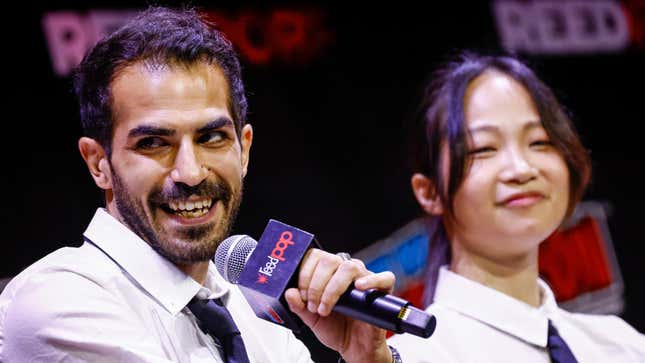Since Chainsaw Man’s anime debut last month, the folks behind the hotly anticipated adaptation have more than delivered on the anime community’s boast of it being “peak fiction” with its bombastic action, enticing story, and beautiful animation. Speaking to Kotaku over Zoom, Ryan Colt Levy, Chainsaw Man’s English voice actor for main character Denji, revealed that the role came naturally to him because of the similarities between his lived experiences and Denji’s struggles to find success and live comfortably.
Read More: Chainsaw Man’s Bombastic, Gory First Episode Lives Up To The Hype
Chainsaw Man is a pulp-fiction-esque manga by Tatsuki Fujimoto. The story follows Denji, down-and-out and living in poverty, who survives by taking odd jobs from the local yakuza to kill devils alongside his adorable half-dog, half-chainsaw companion, Pochita. After a near-death incident, Denji and Pochita fuse, transforming Denji into the powerful Chainsaw Man. While Denji’s initial motivation is literally only wanting to “touch some boobs,” his simplistic aspirations gradually develop as he navigates through the bonkers world as Chainsaw Man.

Levy found Chainsaw Man’s story so special all those years ago because he related to Denji so much. Part of what made Denji so emotionally resonant to Levy was that he also struggled while working shitty jobs he didn’t enjoy. Before Levy got into voice acting four years ago, he was struggling for years while living in what he described as a “survival shack.”
“I was like, ‘I just need to find a place where I can live and afford to live cheaply and try and figure this out.’ I found this little garage unit that was like a makeshift studio that didn’t even have a real kitchen,” Levy said.
Levy’s “survival shack” would often flood and for three years, he had to commute to his job via bike after someone destroyed his car. To make matters worse, Levy’s longtime screamo band also split up during this time, and he’d been laid off from his job as an operations personal assistant at a stop motion studio. Despite the Denji-like hardships, Levy said he feels most connected to the character because of their shared, steadfast optimism that better days are always ahead.
“I think that I understand his simple desires just as much as his complex ones. A lot of people kind of write him off as a simple character, and I think he’s incredibly layered,” Levy said. “The fact that he comes from truly nothing makes him so fascinatingly different from the traditional shonen protagonist and I think it’s why I like him so much. He’s an outsider.”
“The thing that Denji is that a lot of people maybe don’t think of right away is he’s very tender, he’s very loving, and that he has a great depth to him that is great. He just doesn’t know how to express it because he does not have the education and the lexicon of language,” Levy said. It doesn’t mean he’s not deep, it just means he doesn’t know how to let it out. And I think it’s shown the most in his moments with Pochita.”
This revelation influenced Levy’s “risky” decision to play his audition more sensitively instead of sounding cool and brash. The audition scene was from the first episode of Chainsaw Man, where Denji offers his body to the devil if he should meet his untimely demise. At the heart of it, Denji was having a heart-to-heart with his pup, and Levy recognized this. Come September of last year, Levy got the role.
Read More: Anime Voice Acting While Black: Overcoming Hate While Living The Dream
Denji’s life as an outsider within CSM’s world relates to Levy’s own experience as a person of color in the anime voice-over industry. When I interviewed him for My Hero Academia: World Heroes Mission last year, Levy said portraying Rody Soul was important to him not just because it was a prominent role in one of today’s most popular shonen anime, but because it allowed him to represent his heritage as an Iraqi-American actor.
“To be able to represent an underrepresented heritage in this way is so cool. I hope that it will open up more doors for so many talented people who deserve a chance and have something to say and share and I hope this industry is willing to listen more,” Levy said.
The anime industry is a notoriously tough space for people of color. Black voice actors like MHA’s Zeno Robinson and Anairis Quiñones dealt with online harassment after being cast in prominent roles. That harassment can be attributed to several reasons: the industry’s tradition of casting white actors in prominent roles while people of color are allocated to side characters, and the misguided mindset from fans that only white actors can play fairer-skinned anime characters–as if whiteness is the liberating absence of race while all others are limited and defined by theirs.
Luckily, the overwhelmingly positive reception and support to the English CSM voice cast on Twitter helps Levy maintain a positive outlook on the industry at large. On days when it’s harder to be online, especially on Twitter, Levy said it’s important that he and other voice actors trying to navigate the industry remember that social media “isn’t necessarily the real world.”
“I try and keep my heart safe by reminding myself that this is the entertainment industry. And, as much as we want it to be this idyllic place where we can just be artists and all hug each other, I put that [positive] energy out because I want that to be the energy we cultivate,” Levy said. “But I know that it’s also not what everybody wants or is trying to do so try and conserve some of it for my own soul as well.”